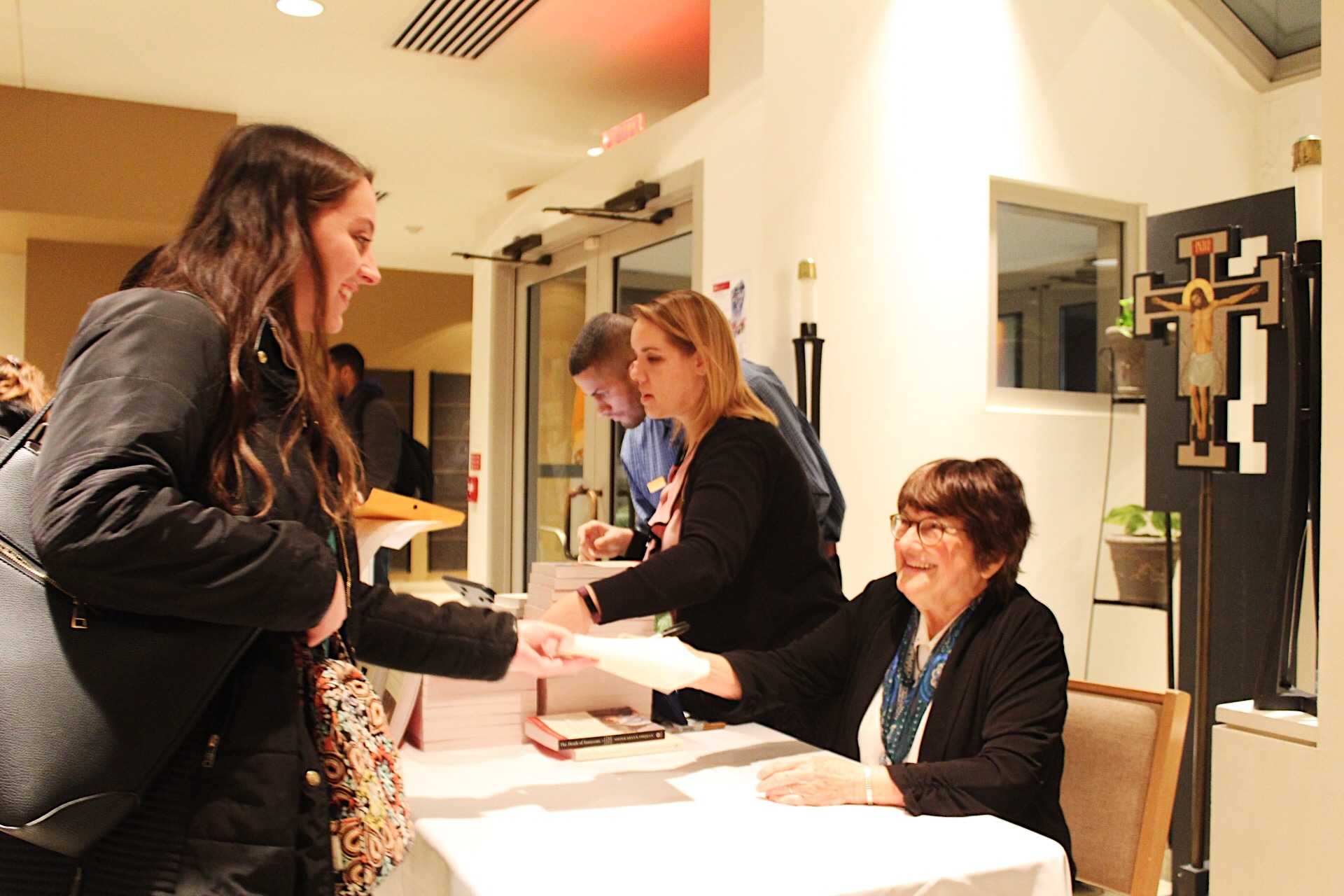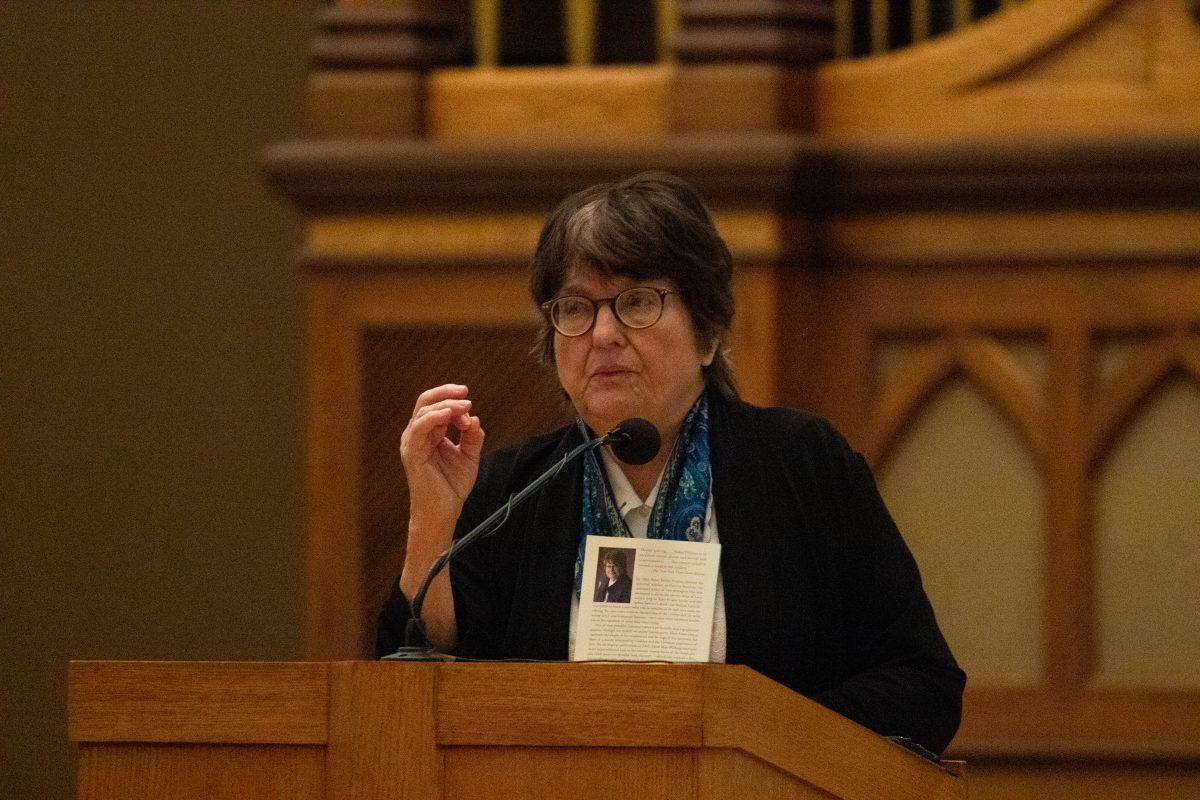Sr. Helen Prejean, CSJ, calls to end capital punishment
Sr. Helen Prejean, CSJ, a nun who witnessed executions of multiple Death Row inmates, gave a lecture in which she once again condemned capital punishment.
Prejean is the author of “Dead Man Walking” and “The Death of Innocents,” which describe her experiences working with inmates on Death Row.

The Nov. 14 lecture, held in the Chapel of Saint Joseph, was sponsored by the Faith-Justice Institute’s Joseph William and Madeline Eberle Klein Fund, which was established to support educational events directed toward greater inclusion within the Catholic Church.
Prejean opened the talk by describing how an invitation to write to Elmo Patrick Sonnier, an inmate on death row, changed her life. Prejean wrote about Sonnier in “Dead Man Walking.”
“This killing was a legal act,” Prejean said. “No religious leaders protested the killing that night. But I was there. I saw it with my own eyes. And what I saw set my soul on fire.”
Prejean explained that because she had not been familiar with the suffering of marginalized people such as inmates before she began communicating with Sonnier, her first encounter with him came as a shock.
“It’s through this heavy mesh screen that I saw his face for the first time,” Prejean said. “And I couldn’t believe how human he was.”
This recognition of humanity has not come all at once for the Catholic Church, Prejean told the audience.
“It took 1600 years for the pope to change the Catechism on the death penalty,” Prejean said. “That’s a long dialogue. But, in the end, what happens, and it happens in our country and it happens in democracy, is we grow as a community in our understanding of issues, moral issues, human rights issues.”
This kind of growth is exactly what Annie Bole, lectures and programming assistant for the Faith-Justice Institute, said she wished for those in attendance.
“We hope the event sparks conversation about capital punishment and encourages students and members of the community to continue thinking about this important issue,” Bole said. “It’s especially important that this event is happening now due to the Catholic Church’s newly adopted teaching that the death penalty is unacceptable in all cases.”
Mike Zelinka ’20 said Prejean’s talk reminded him that there is humanity present in prisons.
“There is this system of fear and politics within the death penalty and death by incarceration,” Zelinka said. “There are people that get a sentence that is about 300 years, when that’s just excessive. It’s a statement piece, not so much an actual verdict.”
Prejean said in her talk that the right to life is a human right.
“Human rights are inalienable just because we’re persons,” Prejean said. “Which means government doesn’t give human rights for good behavior and can’t take them away for bad behavior.”
That message resonated with Chris Perez ’19, who said capital punishment removes humanity from inmates.
“You have to have a humanity aspect of it,” Perez said. “They are people, and they made mistakes. But there’s a humanity aspect of it where you have to respect their lives, even though they made an error.”
In an interview with The Hawk, Prejean stressed the need for student activism in ending capital punishment.
“Get involved with some civil group voting for social change,” Prejean said. “You’ve got to join with other people in doing things, because then you get in the current. If not the Pennsylvania Coalition to End the Death Penalty, what’s Amnesty International doing, here through the school with the Inside-Out program to go into meet prisoners, to write to prisoners, to get some direct contact in some way.”
Susan Clampet-Lundquist, Ph.D., associate professor of sociology, said building relationships with marginalized groups such as prisoners is the key to realizing their humanity.
“It’s really easy to think about humanity if you’re thinking about tutoring a kid in an afterschool program,” Clampet-Lundquist said. “But then when society has demonized a group of people, how do we transcend and think about humanity in its total? When you build relationships with people, their pain becomes your pain and vice versa.”
Alex Mark ’20 contributed to this story



































